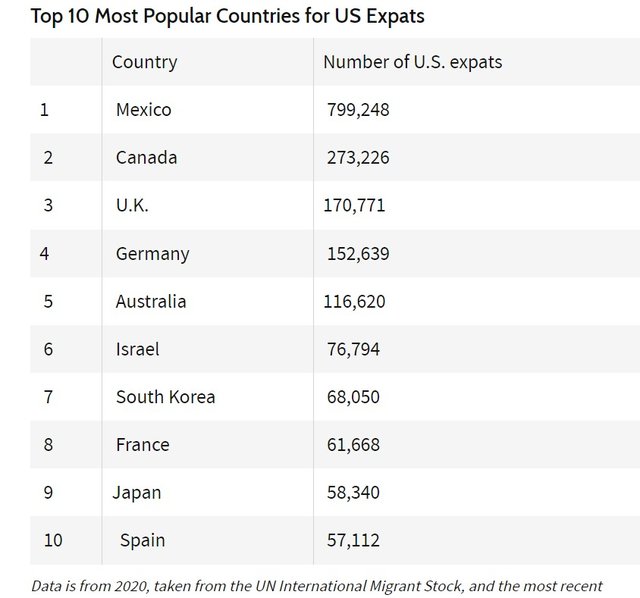
Rebecca Lake
March 28, 2024
Choosing a place to retire is a crucial decision for any retiree, and in recent years, many U.S. residents have decided to live out their retirement abroad. In fact, over 500,000 beneficiaries collected benefits abroad each year, according to the U.S. Social Security Administration.
For some, the main appeal of retirement abroad may be a lower overall cost of living. While retirement abroad requires careful planning about visas, and taxes, staying in the U.S. could mean managing higher costs of living and expensive health care.
This article outlines some data-based considerations for some of the most popular places you could retire abroad if that's part of your retirement plans.
KEY TAKEAWAYS
- Often, retiring abroad can offer U.S. expats lower tax rates, lower housing prices, and lower health care costs.
- In 2020, the most U.S. expats moved to Mexico, followed by Canada, and then the U.K.
- Medicare will not follow you outside of the U.S. if you choose to live in a foreign country long-term, but Social Security payments will.
- Beyond financial considerations, make sure to research a country’s cultural and social norms and to check visa requirements and travel advisories, in order to plan a successful retirement abroad.
The 10 Most Popular Countries for US Expats
Selecting a country to live in can be a difficult task, but many U.S. residents have confronted this challenge and found new homes abroad. If you’re interested in retiring abroad and weighing your options, here are the top 10 most common countries among U.S. expats, according to the latest data from the United Nations Population Division:

available. Puerto Rico was also a popular place for U.S. expats to move, accepting 159,515 U.S. residents in 2020, but as a U.S. territory, it was excluded from this list of foreign countries.
Living Costs of the 10 Most Popular Countries for Expats
There are many financial factors that you must consider when determining your retirement destination. Some important economic determinants include:
- Housing prices
- Health care costs
- Personal income tax
- Property tax
The Organization for Economic Cooperation and Development (OECD) has collected the average financial impact of each factor listed above in countries around the world. The OECD’s selection of countries includes the top 10 most popular countries among U.S. expats, and this data can help you make critical financial comparisons between countries to decide where to retire.
Housing Prices
In terms of housing costs—the average price of the dwelling itself, not including additional utility or maintenance costs—most of the top countries among U.S. expats demonstrate average prices below the U.S. Canada is the only country from the group with above-average housing prices.
Canada has the highest average housing prices across the top 10 countries among U.S. expats, but its housing prices are less than 2% greater than average U.S. housing prices. Meanwhile, South Korea, the seventh most popular country among U.S. expats, has the lowest average housing prices, nearly 30% less than the housing prices of the U.S.
Important: Minimum property investment is a common factor in visa applications, so choosing whether or not to purchase a residence will be an important financial decision if you plan to apply for a visa.
Health Care Costs
Health care in the U.S. is very expensive compared to the top 10 countries among expats, and health care costs are a common concern for retirees who may require increased care as they age.
Out of the 10 selected countries, Israel is the only one with more expensive health care than the U.S., but just barely. Out of all 10 countries, Mexico has the lowest average health care costs, which are 60% less than health care prices in the U.S.
Important: Medicare will not follow you outside of the U.S. if you choose to live in a foreign country long-term, so health care prices are a common concern for retirees living abroad.
The OECD’s health price index accounts for the price of health care goods and services and the quantity of health care, but it does not account for health care quality and system organization.
All of the countries on this list of 10 provide universal healthcare except for Mexico, and for U.S. residents, navigating a new healthcare and health insurance system can be a complicated task.
Tip: If you have specific healthcare needs, make sure to research if your prospective retirement destinations have the specific resources that you need.
Income Taxes
Income tax is an important consideration for U.S. residents receiving income from tax-deferred retirement plans, such as traditional 401(k)s, 403(b)s, traditional IRAs, and pension plans.
In the U.S., the income tax rate is 12.5% when compared to GDP. Mexico has the lowest personal income tax rate (3.75%) out of the top 10 countries among U.S. expats, with less than one-third of the income taxes of the United States. Canada has a similar income tax rate to the U.S.
Important: In some visa applications, there is a minimum income requirement for residency. Check the visa requirements for the country you move to, in order to make sure you are financially able to reside there.
Good news for retirees: Social Security payments will continue for U.S. residents and U.S. citizens who choose to live in any of the top 10 most popular countries among U.S. expats. For some people with substantial outside income, U.S. Social Security benefits are taxed as income, and this regulation continues regardless of a beneficiary’s residence in or out of the country.
Depending on countries’ specific policies about foreign social security, your Social Security payments may also be taxed by your country of residence as foreign income, as foreign social security is taxed in the U.S.
Warning: If you are a U.S. citizen who plans to work part-time while retired abroad, be aware that you may have to pay social security tax to the U.S. and to your country of residence.
Some countries have totalization agreements with the U.S. which allow workers to pay Social Security taxes once, instead of twice. Out of the 10 countries listed in this article, all except for Mexico and Israel have totalization agreements with the U.S.
If you choose to retire in another country, be sure to check the Social Security Administration website if you are eligible to receive your Social Security payments there. If you choose to work in another country while retired, check the Social Security Administration website to learn if you will have to undergo dual taxation on your Social Security benefits.
Moreover, if you are a U.S. resident but not a U.S. citizen, the guidelines for receiving Social Security benefits outside of the U.S. may vary by marital status, age, time in the country, or other factors. You should check the Social Security Administration’s specifications for your situation.
Property Taxes
Compared to its GDP, the average U.S. property tax rate is 2.9%. Among the countries most popular with U.S. expats, Israel and the United Kingdom have the highest property taxes, at 4% of GDP. Meanwhile, Germany and Mexico have the two lowest property taxes, with tax rates of 1.1% and 0.3% of their GDPs, respectively.
Like with housing prices, property taxes are an important financial consideration when moving abroad.
Plus, purchasing real estate above a certain minimum can help you attain a visa on certain applications, so property tax can become an important factor when retiring abroad. For example, making a real estate investment above €500,000 in Spain for an investment return period of at least five years can grant you a Spain residence permit.
Frequently Asked Questions (FAQs)
What Is the Best Place to Retire Abroad?
Mexico is the most common residence abroad among people from the U.S. as of 2020.2 Mexico’s housing prices are 21% less than the average housing prices in the U.S., and Mexico’s healthcare costs are 60.1% less than that of the U.S. Mexico’s personal income tax, by percentage of GDP, is half that of the global average, and property tax as a percentage of GDP is less than one-sixth of the global average. Mexico also allows U.S. citizens to reside in the country for up to 180 days without a visa, and the country’s proximity to the U.S. can make it a convenient destination for retirees with family still living in the U.S.
Where Can I Retire Outside the United States?
Where you retire is completely up to you, but some countries are more convenient, affordable, and friendly to U.S. residents than others. The U.S. The Department of State website regularly updates their country-specific visa requirements and travel advisories, for those curious about moving to specific countries. Plus, it is helpful to note that the top 10 most popular countries among U.S. expats in order of most to least popular are: Mexico, Canada, the U.K., Germany, Australia, Israel, South Korea, France, Japan, and Spain.2 Many of these countries offer below-average costs of living.
What Countries Do Not Tax U.S. Social Security Benefits?
For some people with substantial outside income, U.S. Social Security benefits are taxed as income by the U.S. regardless of a beneficiary’s residence in or out of the country. Depending on countries’ specific policies about foreign social security, your payments may also be taxed by your country of residence as foreign income, as foreign social security is taxed in the U.S. Beyond this group, some foreign countries do not have any income tax, and therefore they do not tax U.S. Social Security benefits.
The Bottom Line
Retirees may choose to live abroad for a lower cost of living in addition to lifestyle aspirations. If you plan to retire abroad, make sure to research housing prices, health care costs, and tax burdens as you choose your retirement destination. Plus, there are specific Social Security, visa, and tax rules for each country, and understanding these regulations will help you choose the country that best suits your needs and financial situation.
Beyond financial considerations, retirement abroad is a massive undertaking, and doing comprehensive research is key to planning a successful and sustainable retirement. Plus you may confront language barriers and cultural differences. Considering financial factors in addition to cultural and social ones will help you make a holistic decision that best supports your retirement.



